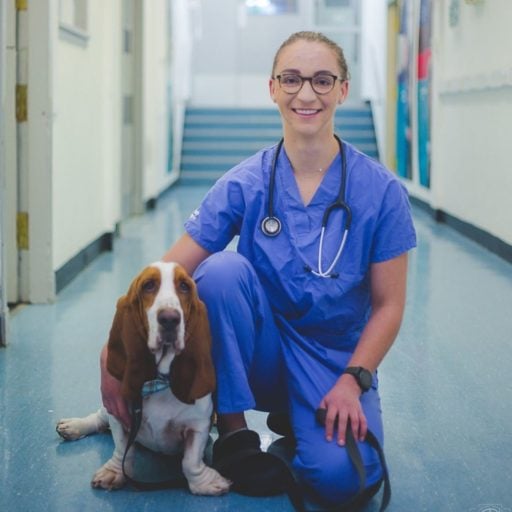 alt=”Upclose with a dog at the shelter”>
alt=”Upclose with a dog at the shelter”>
Loop Abroad student Amelia Matczak shares 4 key ways to improve your GRE score for vet school.
 You are looking to improve your GRE score for vet school, but how? Standardized testing is never easy to prepare for, especially when you know a lot of schools take your GRE scores into consideration for admission. Luckily, outside of just paging through a GRE study book, there are a few things I learned from preparing for the GRE that really helped me out along the way:
You are looking to improve your GRE score for vet school, but how? Standardized testing is never easy to prepare for, especially when you know a lot of schools take your GRE scores into consideration for admission. Luckily, outside of just paging through a GRE study book, there are a few things I learned from preparing for the GRE that really helped me out along the way:
1. Know What Score you Need. Before you can even begin studying for the GRE, it is very important that you know what constitutes a good GRE score. According to Admissions Consultant, the average GRE scores for vet school ranges from 150-160 for qualitative and 151-160 for verbal. Some schools have higher average scores than others, but most AVMA accredited schools have averaged in the middle of those ranges.
My recommendation: A score of 155 in both verbal and quantitative should make you a competitive applicant at most AVMA-accredited vet schools. That said, if you have a specific school in mind, I would take the time to look at their student averages before you set your goal numbers.
2. Study. Maybe seemingly obvious advice, but the best way to improve your GRE score for vet school is to study. We all hate doing it, but when you only have to sit the GRE once instead of two or three times, it will be worth it.
You can buy GRE study books just about anywhere, but Amazon has a good selection to choose from. According to Prep Scholar, most people study for the GRE a few hours a week for one to three months before they sit the exam. Now, I realize this is a huge range, but it’s a range for good reason. Some people are naturally good at standardized test-taking, others need more time to prepare for them. Since everyone is different, the amount of time you will need to spend studying depends on your individual test-taking style.
There are also lots of good free tools online for getting extra practice questions, video explanations of concepts and questions, vocabulary lists and apps, and practice exams.
My recommendation: Take a baseline practice exam three to four months before you plan to sit the GRE to see where your score is currently. If it falls within the average GRE scores for vet school, then maybe you only need to study for an hour a two daily the month leading up to the exam. If you scored lower than you had hoped, start studying earlier and put some more time in during the week. For me, I started studying two months before I sat the exam and I would just run through practice questions on my lunch break.
3. Sleep. No one, and I mean NO ONE, has ever improved their GRE score by staying up until 2 am the night before in an attempt to learn a few more words or run through a few more practice questions. The exam itself is around four hours of you, by yourself, in a completely silent room staring at a computer screen. If you show up to the GRE on just a few hours of sleep, you’re going to have a hard time staying awake, let alone be able to use all of your critical thinking skills.
My recommendation: Get yourself into a good sleep schedule a week or two leading up to the exam. Go to bed at the same time and wake up at the same time. This will ensure that you are well rested the morning of the exam, and the routine of it can help you fall asleep despite the pre-exam jitters.
4. A Holistic Review. Remember, your GRE score is just a piece of your application! There is so much more that goes into being a good vet school candidate beyond the ability to do well on one standardized test. There are your course grades, animal experience, letters of recommendation, essays, and extracurricular activities still to consider. So, although you should try and do the best you can on the GRE, schools take a holistic review of you as an applicant; meaning they aren’t looking at just one factor to determine your admission status.
My recommendation: Try your best on the GRE, but don’t stress yourself about just one piece of your application. We all want to get a good GRE score for vet school, but the reality is that whatever score you get is just a small cog in your application. Remember that you can take it again, and unlike some other standardized tests, it is not restricted to just a few dates a year. Keeping this perspective will help you to manage your stress and keep a realistic view of the process during this stressful time.